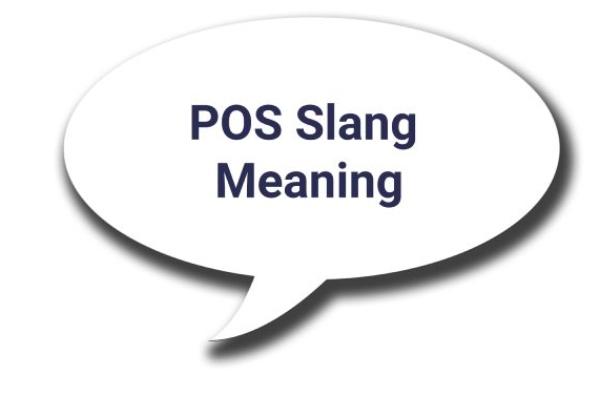Parents often have a hard time deciphering the digital language of their children. Acronyms and abbreviations are the focal point of teen texting, and leave a lot of adults perplexed. One common question that parents face is what does POS mean in text? This slang is more important than it may seem. Teens use it to indicate privacy issues, conceal conversations, or quickly change topics.
For parents, having knowledge of terms such as POS are a must in keeping children safe from hidden online risks. In this article, we explain what POS means in texting, explore its various meanings, discuss why teens use it, and cover some of the risks of ignoring such slang. We will also explain some parental control tools, like FlashGet Kids, that help you keep track of such acronyms. Awareness and technology can be used together to help parents create safer digital spaces for kids.
What does POS mean in text?
POS is an abbreviation used in text messaging and online chat rooms. The most common translation among teens translates to “Parent Over Shoulder.” It is written in the situation that a parent is physically present and watching or is likely to see the screen of the child. For instance, if a teen is sharing private information with friends, they might type “POS” to indicate caution. The conversation quickly slows down, often ending before parents realize.
The main uses of POS with teens are in texting apps like WhatsApp, Snapchat, Instagram direct messages, or gaming chats. The slang saves time and transmits the sense of urgency in a short time. This is similar to an immediate code. A peer reading the chat changes the subject. So, this reduces suspicion from adults who are standing close to the child.
Parents need to know that acronyms such as POS say a lot about how youth communicate. It demonstrates how fast they have adapted slang to preserve peer privacy. While not dangerous per se, the acronym definitely reflects a need for secrecy. That is what makes it important for the parents to decode.
In short, POS in text works as a shield. It helps children to avoid asking questions, stop embarrassing conversations, or even hide inappropriate interactions when adults are nearby. For parents, this means ignoring the signals of what conversations are going on behind the screen.



Different meanings of POS in text
The abbreviation of the word POS means different things depending on the cultural, professional, or age-related context. It can be a source of confusion with this variety. Parents must draw conclusions about which meaning to use, particularly in personal messages.
Parent Over Shoulder
This is the principal teen slang meaning. Kids mostly type POS when adults are around. It is a quick precaution in order to change the conversation or prevent discovery. This usage directly has an impact on parental supervision.
Piece of Sh*t
This is an offensive form. It is quite commonly used by older teens and adults as a form of insult. As an illustration, a failed gadget may be called POS or this slang may be used to offend a person directly. Parents need to be aware if kids are getting into this tone. It may become the norm for using vulgar language or hostile ways of communicating with peers.
Point of Sale
In business and retail, POS is an abbreviation for “Point of Sale.” It is used to refer to systems that process transactions. In professional texting, however, this meaning is common. Still, parents seldom experience this in teen speech.
Positive (POS)
In a medical or informal setting, POS may mean “positive.” For example, test results may be labelled POS. Some online discussions use this abbreviation as well. It is very context-specific.
Position
In such gaming or sports situations, POS can mean “position.” Gamers tend to use slang to define the player positions to communicate quickly. For example, a player might type “POS left” for his team’s positions.
Possible
Some of the chats replace the word possible with POS. This is not so common, but still known in casual online forums.
Power of Suggestion
In the psychology or wellness communities, POS may mean “power of suggestion.” While this is not common with teens, it’s something parents might see in some niche spaces.
Parents need to make judgments about meaning based on context. If their teen types POS frequently in other casual chat, the “Parent Over Shoulder” or vulgar meaning is most likely. Knowledge of these variations avoids being misinterpreted, and it assists in knowing where to put emphasis.
Why do teens use POS in chats?
After learning what does POS mean in text, let’s learn why do teens use it in chats here. Teens use acronyms such as POS for many reasons. Online language is indicative of race, secrecy, and group norms.
Privacy management
Teens want independence when they are chatting. POS signals straight away when there are adults hovering around. They are afraid of being judged about conversations, even if they are harmless. Privacy is a great incentive for coded language.
Coded peer communication
Slang and abbreviations serve to build group affinity. Using POS makes the teens feel “in the know.” Shared slang creates community through bonding. It also doesn’t include outsiders, primarily adults.
Filter for inappropriate content
Some teens use POS to conceal sexting, explicit jokes, or communication with strangers. They take a conversation off track if parents glance over by typing POS. This avoids the discovery of content that might be unsafe.
Avoid embarrassment
Even innocent conversations are awkward in front of parents. Teens talking about friendships, roleplay, or school secrets often type POS to avoid explanations.
Peer conformity
Slang spreads fast. Many teens use acronyms just because their peers use them. The fact is that using POS is part of digital culture, whether or not the content is inappropriate.
Gaming and multitasking
Some situations require a quick reaction. Gamers may type POS fast, either to mean “position” in gameplay, or as “parent over shoulder” if adults walk in mid-session.
These reasons prove that while POS is often harmless, it is still hiding conversations. Parents should not panic each time they find POS. However, the repeated use may indicate patterns of secrecy.



Control and monitor online activities effortlessly, ensuring peace of mind.
Risks for parents if they don’t understand POS
Ignoring teen slang comes with a number of risks. Parents who are unable to interpret digital codes lose sight of their child’s life online. Acronyms such as POS illustrate the speed with which children have become adept at using the tools being developed for secrecy.
A 2023 Pew Research Center survey found that 46% of U.S. teens say social media exposes them to too much drama, and 32% report seeing content about self-harm, suicide, or eating disorders. This highlights how online platforms can push harmful or inappropriate material into teens’ feeds. However, many teens rely on acronyms, such as POS, to mask such exposure. If parents are in the dark they might not pick up the early signs of danger.
Key risks include:
1. Unsafe conversations are not noticed:
Teens will chat with others they do not know or engage in sexting. POS gives them the ability to hide exchanges instantly. Parents lose the opportunity to intervene at an early stage.
2. Cyberbullying proof hidden:
When peers are sending hurtful texts, victims are allowed to conceal chats using POS signs. Parents who do not know about slang may not be able to recognize these warning signs. Emotional stress may build up if there is no guidance.
3. Normalizing vulgar acronyms:
If kids use POS as “Piece of Sh*t,” parents may underestimate the effect that abuse of language has. Teens can normalize insulting each other.
4. Exposure to explicit risks:
Some teens trade explicit images. Slang codes such as POS help to protect them from detection. Unaware parents can miss signs of dangerous behavior.
5. Slang evolves rapidly:
Today’s acronym may change tomorrow. Parents who are not up-to-date on trends are at risk of further widening the communication gap. This makes it more difficult to navigate teens across digital platforms.
Digital slang is not necessarily harmful. But when it becomes an enabling of secrecy, risks become high. When children are unaware, parental supervision tends to become less effective, and children become vulnerable.
How parental control helps parents decode POS and other slang?
Parental control tools fill the digital knowledge gap. They enable the parents to supervise the activity while balancing respect for independence. FlashGet Kids is one such tool that provides many safety features.



Essential features include:
1. Keyword alerts
Parents receive instant notifications when specific slang or acronyms appear. For example, if a child in chat types or receives “POS” the system alerts you immediately. This is in order to assist parents in identifying risky behavior as it happens.
2. Chat monitoring
Instead of reading all messages by asking the child for their social account, parents can monitor suspicious conversations between messaging platforms using notification tracking. This allows for a more comprehensive monitoring setup to keep kids safe online.
3. Activity reports
Parents receive daily or weekly app activity summaries. These reports show behavioral trends. These can be spending a lot of time chatting late at night, or switching too many apps. Trends often indicate if a child is hiding risky behavior.
Such tools give parents the power of data. Technology increases awareness of acronyms like POS. Parents do not have to hover in a physical way because digital alerts are a way to create transparency.
Importantly, parental controls serve to encourage dialogue, too. Parents can openly talk about alerts. The goal is not punishment but education and trust. With FlashGet Kids, understanding slang becomes manageable, while at the same time maintaining safety.
Conclusion
Understanding what does POS mean in text is becoming highly important for parents who are supervising teens. While POS has many meanings, the one that is most relevant for kids is “Parent Over Shoulder.” This is an acronym that indicates how kids try to cover up conversations and maintain privacy.
Ignoring such slang leaves the door open to risks such as sexting, cyberbullying, contacting strangers, or being exposed to harmful content. Slang changes quickly, but parents can stay prepared with awareness and diligence.
This vigilance has been enhanced by technology. Tools such as FlashGet Kids offer keyword alerts, chat monitoring, and activity reports. Couple that with parental awareness, and these form a balanced digital safety net.
Through being updated and employing trusted instruments, parents will be able to honor autonomy and avoid damage. Acronyms like POS might be small, but by decoding them, it builds trust, enhances dialogue, and secures children from the risks online. Awareness with the use of technology is the key to parenting in a digital age.

